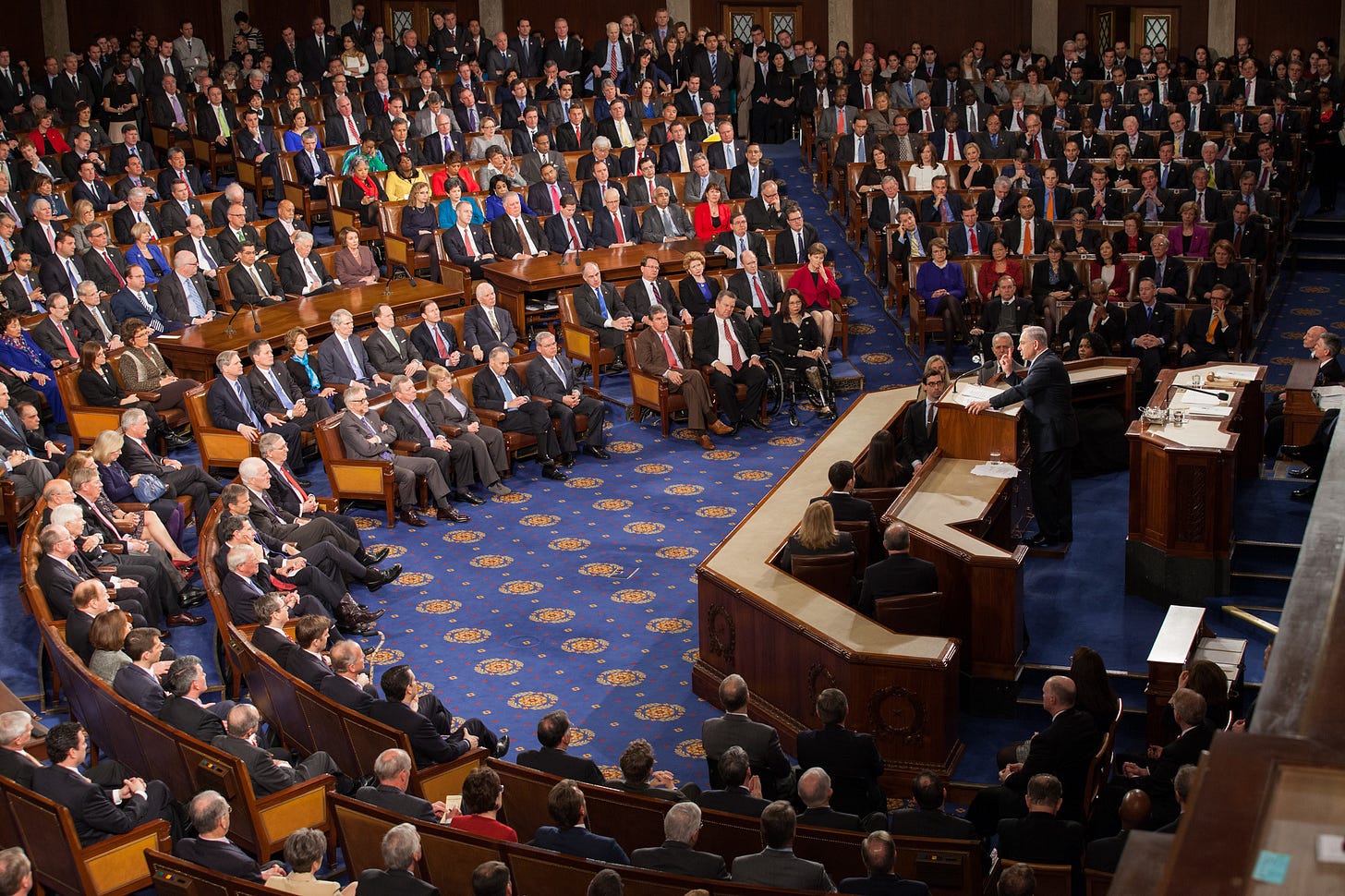The Religious Politics of Israel
Mike Evans, a prominent Christian author and evangelist, is having a bad year. He was a member of former President Trump’s evangelical advisory board and watched his preferred U.S. leader leave office in a swirl of chaos and controversy. Now, another politician he has devotedly supported is also facing ouster from office.
Benjamin “Bibi” Netanyahu, the longest-serving prime minister in Israel’s history, looks likely to lose his position if a new coalition government is formed next week, as expected. (Netanyahu is not going quietly and appears to be borrowing Trump’s “election fraud” playbook.)

This is not sitting well with Mike Evans. He wrote rambling, lewd, egomaniacal, and vitriolic rants in response. He went after the leaders of the new coalition: “They’re willing to carve up the bird, the soul of the nation, simply to vent their spleens on one man they despise and God who chose him to be prime minister. God knew from the beginning to the end. He knew Bibi then and Bibi now. I haven’t heard God choose any of these fools.”
Evans also appeared to blame Jews for the Holocaust as he suggested those who opposed Netanyahu were doing the same thing: “I understand how the Holocaust happened. German Jews were busy insulting each other, drunk on the wine of pride. They did not see the smoke of Auschwitz rising because they were more German than they were Jews.”
Then he addressed an expletive-filled letter to the man in line to be Israel’s next prime minister: “Don’t ever call yourself a defender of Zion. You’re not. You betrayed the very principles that a generation gave their blood for and died for. You want to be in bed with the Muslim Brotherhood and leftists. God have mercy on your soul. You’re a pathetic, bitter little man so obsessed on murdering Netanyahu that you’re willing to damage the State of Israel for your worthless cause.”
You should not dismiss Evan as a gadfly or inconsequential. He runs multiple ministries devoted to building support for Israel, including Churches United With Israel, the Jerusalem Prayer Team, and the Friends of Zion Museum. The latter purports to tell the stories of “Christian Zionists who have stood with courage” alongside the modern nation of Israel, which the museum refers to as fulfillment of “biblical prophecies.”
Nor is he a stranger to politics. He met with Trump and then-U.S Secretary of State Mike Pompeo as he advocated for moving the U.S. Embassy in Israel to Jerusalem and for the administration more closely supporting Netanyahu’s policies. Evans has been close to a number of Israeli leaders beyond Bibi, including former prime minister Menachem Begin.
In this issue of A Public Witness, we try to understand the fury of Mike Evans by examining the ways and reasons American evangelicals have embraced the current Israeli government. Perhaps the looming transition in Israeli politics from the charismatic leadership of Netanyahu to an unprecedented coalition government featuring right, center, left, and even Islamist parties is the chance to interrogate what the attitude of U.S. Christians towards Israel should be.
The Uniqueness of American Evangelicals
In 2013, the Pew Research Center conducted a poll that found 82% of white evangelicals believed God gave the land of Israel today to the Jews. Neither this claim nor the support for it will shock you. What you may be surprised to learn is that only 19% of the small community of Christians living in Israel agree. And 86% of Israeli Christians (most of whom are Arab) said they felt the U.S. was too supportive of Israel politically, while just 12% of U.S. white evangelicals agreed.
More interesting still is that white evangelicals in the U.S. reported higher responses on these questions than American Jews. From tourism to political support, these evangelicals are becoming an increasingly key base of support for Israel. The former Israeli Ambassador to the U.S. Ron Dermer has called for Israel’s government to intensify engagement with American evangelicals. Noting that evangelicals make up a quarter of the U.S. population and Jews less than 2%, he explained, “If you look just at numbers, you should be spending a lot more time doing outreach to evangelical Christians than you would do to Jews.”

So, when Mike Evans declared at a press conference in Jerusalem earlier this week that “Bibi Netanyahu is the only man in the world that unites evangelicals,” he might be correct. Polling has shown that U.S. evangelicals view the prime minister more favorably than any other world leader. Here, again, there appears to be a divide between these American Christians and their counterparts in the Middle East.
Azar Ajaj, president of Nazareth Evangelical College, told us this week there are several reasons why Christians there are less supportive of Netanyahu. One of the several issues cited is the ongoing trial related to bribery, fraud, and other corruption charges that could end with Netanyahu serving significant prison time.
“Although he has not been convicted yet, as Christian believers we can’t support him,” Ajaj explained. “Netanyahu created a culture of lies and of breaking promises to the point that he was not able to convince any member of Knesset to move to his coalition so he can stay in power despite very generous offers. They simply do not believe him.”
This disconnect between U.S. and Israeli Christians came to head several years ago as Sen. Ted Cruz spoke at an event designed to draw attention to the plight of Christian communities in the Middle East. Addressing a crowd composed of many Arab Christians, Cruz declared, “Christians have no greater ally than Israel.” His remark quickly prompted boos and shouts of opposition. Instead of considering why his words were met with this response, Cruz doubled down.
“Those who hate Israel hate America,” he said to more boos and shouts. “If you will not stand with Israel and the Jews, then I will not stand with you.”
Shortly thereafter, Cruz launched his run for the presidency with a campaign heavily focused on winning the support of white evangelicals. You could surmise that his speech was all an act designed to provoke outrage among many in order to solicit the support of this important constituency.
This was the conclusion of the conservative Christian writer Rod Dreher who called Cruz to account: “I still could not get over the audacity and the cruelty of the act, and the shamelessness of his using the most persecuted and threatened Christians in the world to boost his own political prospects or to cover his flank with his domestic audience.”
Cruz may have exploited this dynamic, but he’s not the only one.
Friends in High Places
In the era of Trump, evangelical support for a non-religious politician facing numerous scandals is no longer beyond our collective imagination. But the support for Netanyahu actually prefigures that of Trump by decades.
Netanyahu first served a three-year stint as prime minister in the late 1990s, then fell from power in part due to corruption allegations. But, after a brief political exile in the private sector, he managed to work his way back up through his party’s leadership and again into the prime minister’s role just a decade after losing it.
During his earlier stint as prime minister, Netanyahu found friends among conservative Christians. Almost as soon as he assumed the office in 1996, he created the “Israel Christian Advocacy Council” and brought Christian leaders over to Israel. At odds with then-U.S. President Bill Clinton, Netanyahu met with Jerry Falwell Sr. and other anti-Clinton Christian activists — as his first stop in town — to secure political support in Washington, D.C. that did not require a close friend in the White House. These strange political bedfellows — fundamentalist Christians in the U.S. and a non-religious politician in Israel — built a relationship that endures.

At an evangelical conference in 2012, televangelist and end-times preacher John Hagee introduced Netanyahu by comparing the prime minister to Moses and King David. Netanyahu returned the favor as he spoke to such events year after year. At a Hagee event in 2017, Netanyahu proclaimed that Israel “has no better friend” than evangelical Christians. He added, “When I say we have no greater friends than Christian supporters of Israel, I know you’ve always stood with us.”
But this approach can also be dangerous when political winds change.
With Trump in the White House partially because of white evangelical support, Netanyahu found a powerful ally. Yair Lapid, the second-most significant figure in the new coalition government ousting Netanyahu, pointed to that dynamic in an interview in March as Israelis went to the polls. He said that relying too heavily on evangelicals and other Republicans means “Netanyahu is playing with fire” in dealing with American politics. Lapid instead urged a more bipartisan approach to such a critical relationship.
When the Israeli government transitions power next week, the diplomatic approach may change, but the views of many U.S. Christians towards Israel will not change. That’s because this support is not rooted in political beliefs but is motivated by a theological agenda.
A Chosen Nation?
“Among the many ways to fracture a congregation,” the Lutheran pastor and scholar Philip Pettit warned, “talking about Israel is one of the most dependable.”
For some Christian Zionists, modern-day Israel is not just a country or a populace but a fulfillment of biblical prophecy heralding the end times. One fateful day, the biblical temple will be rebuilt in Jerusalem, prompting the return of Christ and inaugurating a final, bloody war between the forces of good and evil.
These beliefs, informed by a narrow and particular way of interpreting scripture, animate the strong financial and political backing of Israel within segments of the American evangelical community highlighted above. Aware of these intense convictions, former President Trump explicitly stated that he recognized Jerusalem as Israel’s capital “for the evangelicals,” who then played their part in praising his decision.
Others challenge this conflation of current events with biblical prophecy. As Gary Burge, a New Testament scholar at Calvin Theological Seminary put it, “We have a political application of a biblical idea. If you reach into the [Hebrew Bible] and say, ‘God has given the Holy Land to the descendants of Abraham,’ that’s fine. The question is whether the modern state of Israel is that nation that was imagined back in the Bible.”
The trap that Christian Zionists fall into is elevating the modern, nation-state Israel to a Divine status that leaves it beyond judgment, critique, or reproach. Burger explained that “[Evangelicals] believe that Israel has a unique place in history as God’s special people, so Israel deserves deferential treatment.” Thus, he added, “the average conservative evangelical” believes that “if Israel wants something” then “Israel deserves to have it.”
This is the crux of the problem. Once any country is placed on such a pedestal, then criticism becomes illegitimate. Anyone challenging the motivations or actions by the nation or its leaders commits an offense against God. We have denounced this tendency toward Christian Nationalism in America, and we lament the presence of the same dynamic within much of Christian Zionism.
Christians can value the special place of Israel in the biblical story (and hold differing views about the role it will play when God eternally reconciles all things), while still evaluating its leadership and activities in the same manner as other nation-states with a stake in and responsibility for the flourishing of the present world.

This assertion of assessing leaders of each nation on moral standards comes from the witness of scripture itself. In his book Chosen?: Reading the Bible Amid the Israeli-Palestinian Conflict, the acclaimed minister-scholar Walter Brueggemann emphasizes that the land “is given to Israel unconditionally, but it is held by Israel conditionally.” Even the biblical Israel faced prophetic critiques and demands for accountability when its leaders acted wrongfully or the nation veered off course.
That’s the perspective of Yohanna Katanacho, a Christian theologian who teaches at Nazareth Evangelical College in Israel and Bethlehem Bible College in the West Bank. He told us this week that his critique of Netanyahu comes from an application of ethical governance: “From a Christian point of view, leadership is measured by its compatibility with kingdom ethics. These ethics include integrity and an inclusive vision for the well-being of the whole society.”
Simply put, there’s nothing in scripture or Christian theology that prevents an honest and fair evaluation of what modern Israel does and the choices made by its leaders. This is a lesson understood by both American and Israeli Jews, along with Christians living in Israel and Palestine. It is time for American Christians, especially Christian Zionists, to update their thinking.
Theology for Peace & Justice
Yohanna Katanacho, the Arab Israeli Christian theologian just mentioned, is optimistic that Netanyahu’s fall could bring better leadership for the nation.
“Netanyahu fails to embody a form of leadership that I want to encourage or imitate or replicate. He is accused with corruption, he has betrayed many of his partners, and he has advocated several laws that embody discrimination,” Katanacho explained. “I hope and pray that Israel will one day have a leader who is a true peacemaker and who is willing to create a society of justice and love for both Arabs and Jews.”
And his colleague Azar Ajaj, quoted earlier in this piece, echoed the belief that a chance for peace could come from political change: “We take the mission to be peacemakers seriously. Netanyahu did not make any effort to activate the peace talks but just managed the conflict. Netanyahu incited against Arab Palestinians, including Christians, in Israel and thus alienated them.”

While Katanacho and Ajaj teach and work toward peace right there in Israel, many Christian Zioinsts in the U.S. actively pray and even politic against peace efforts. For those with a theology focused on an end-times reading that concludes in epic violence, such peace is not the goal.
“Many of these Christian believers are convinced that there will eventually be an apocalyptic war between God and evil in the near future: as a consequence, there can be no peace between Jews and Arabs,” Rabbi Dan Cohn-Sherbok, professor of Judaism at the University of Wales wrote in his book The Politics of Apocalypse: The History and Influence of Christian Zionism. “Not surprisingly, a number of Christian Zionists are critical of the peace process since it threatens to legitimize Palestinian claims to Jerusalem and other parts of Israel.”
This means Christian Zionists often oppose the very measures that would help Palestinian Christians in Bethlehem, Gaza, and elsewhere.
“We know that certain theologians in the West try to attach a biblical and theological legitimacy to the infringement of our rights. Thus, the promises, according to their interpretation, have become a menace to our very existence,” a group of Palestinian Christians wrote in a 2009 declaration. “The ‘good news’ in the Gospel itself has become ‘a harbinger of death’ for us. We call on these theologians to deepen their reflection on the word of God and to rectify their interpretations so that they might see in the word of God a source of life for all peoples.”
Thus, those Palestinian Christians issued to global Christians “a call to repentance; to revisit fundamentalist theological positions that support certain unjust political options with regard to the Palestinian people.” They urged us “to stand alongside the oppressed and preserve the word of God as good news for all rather than to turn it into a weapon with which to slay the oppressed.” In that way, the Palestinian Christians added, we can live out “the mission of the Church,” which “is to proclaim the Kingdom of God, a kingdom of justice, peace, and dignity.”
No matter who is in government, may we work toward that vision through our prayers, preaching, and practices.
As a public witness,
Brian Kaylor & Beau Underwood




Thank you for this thoughtful critique. May a change of leadership in Israel bring a new opportunity for diplomacy to win peace for all in Israeli-Palestinian relations. May evangelicals in America respond by supporting peace for all, if for no other reason than the benefit peace will bring to Christian brothers and sisters in Israel and Palestine.
Very insightful article which pushes through the veneer of anti-Zionism = anti-Semitic. And another compelling truth-point for why we must keep religious and political dialogue strictly separate!